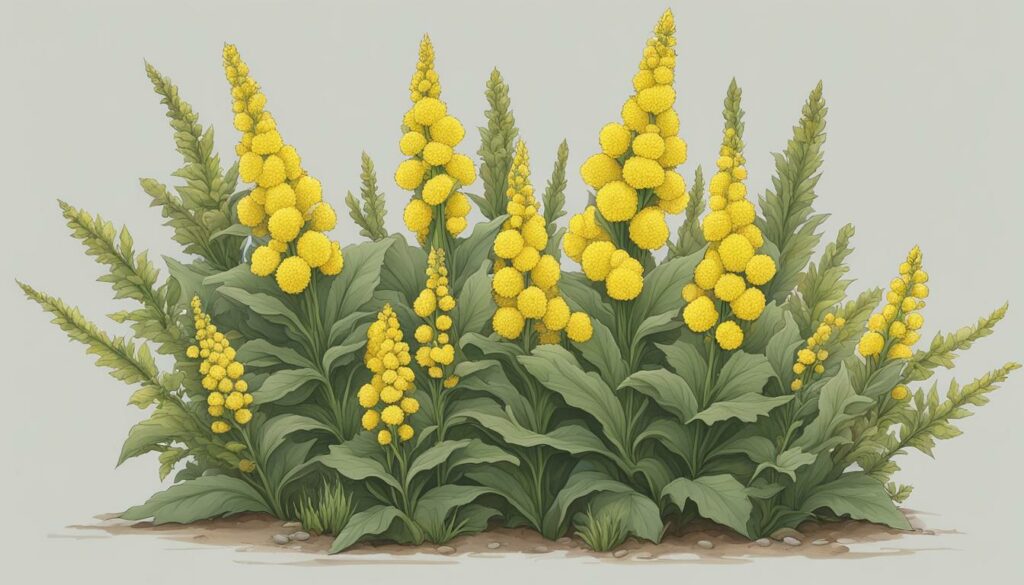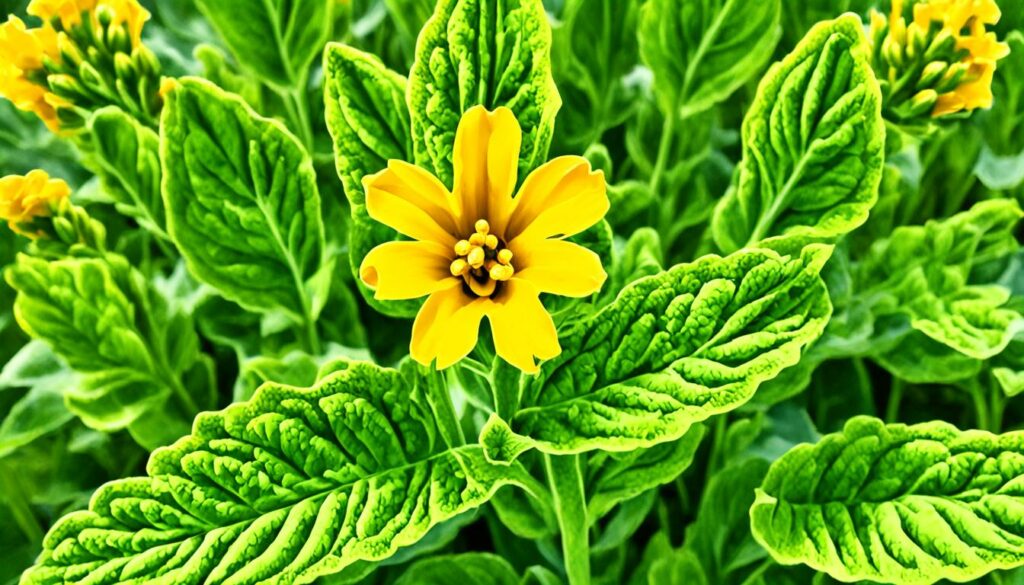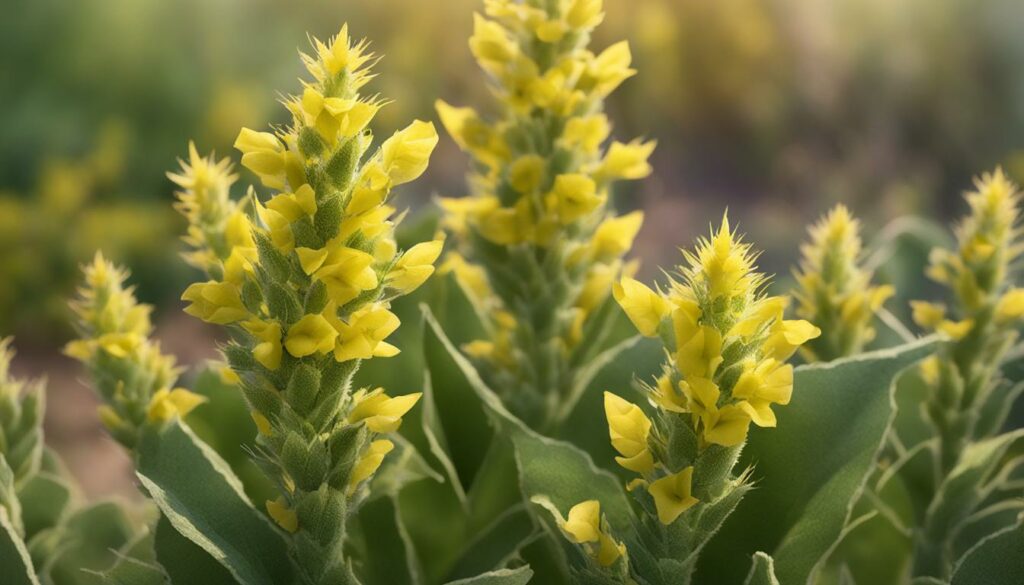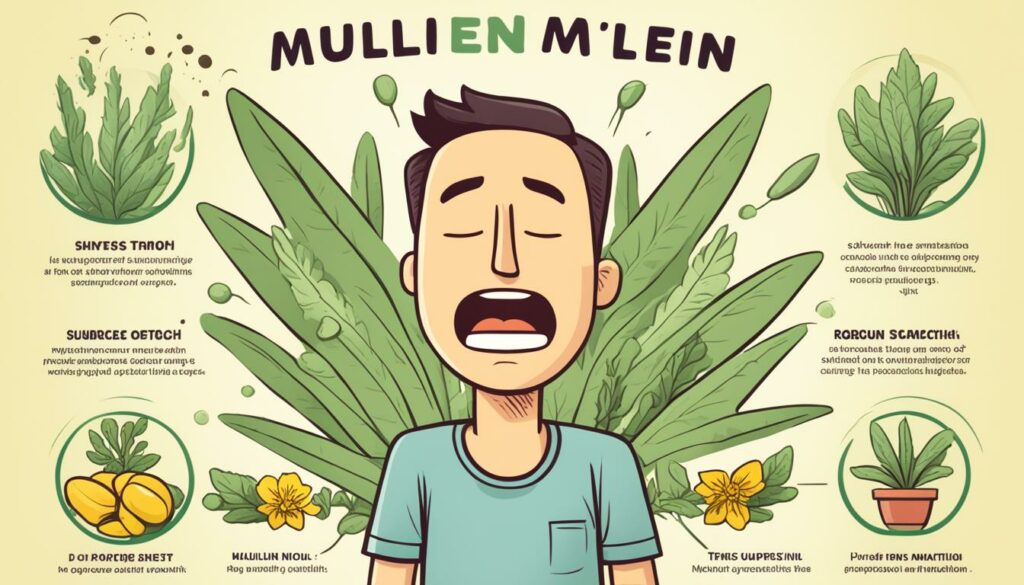Welcome to our article on mullein uses and its incredible health benefits. Mullein, a versatile herb with a rich history in herbal medicine, has been valued for centuries for its numerous medicinal properties. In this article, we will explore the various uses of mullein and how it can support your well-being.
Understanding Mullein: A Versatile Plant with Many Species
Mullein is a fascinating plant that offers a multitude of uses, with over 200 different species to explore. Among these species, common mullein (Verbascum thapsus) stands out as the most commonly used for its medicinal properties. This remarkable plant can be found in various parts of the world, including the United States.
The leaves of the mullein plant play a crucial role in herbal medicine. They are carefully harvested and can be used either fresh or dried to create a wide range of herbal products. With its long history of usage in herbal remedies, mullein has gained popularity as more individuals recognize its potential benefits.
To provide a visual representation, here’s an image of the common mullein plant:

Exploring the Benefits of Mullein
Mullein is a versatile plant that offers a wide range of health benefits. Its therapeutic properties can be attributed to the presence of compounds such as saponins, flavonoids, and phenylethanoid glycosides, which give mullein its antioxidant and anti-inflammatory properties.
One of the key benefits of mullein is its positive impact on respiratory health. It is known to be effective in soothing coughs, clearing congestion, and providing relief from respiratory conditions such as bronchitis and asthma. The mullein herb has expectorant properties, meaning it helps to loosen mucus and phlegm, making it easier to expel.
Moreover, mullein exhibits analgesic and anti-inflammatory effects, which can provide relief from pain and inflammation. It can be particularly beneficial for individuals experiencing discomfort caused by respiratory infections or other inflammatory conditions.
While many of the benefits associated with mullein are based on traditional knowledge and anecdotal evidence, its potential as a natural remedy for respiratory health and cough relief is promising. However, it is important to note that more research is needed to fully understand the extent of mullein’s therapeutic effects and its optimal usage.
Discover the various benefits of mullein in the table below:
| Benefit | Description |
|---|---|
| Soothing Coughs | Mullein helps to alleviate coughs by loosening mucus and promoting expectoration. |
| Respiratory Health | It supports respiratory well-being, providing relief from congestion, bronchitis, and asthma. |
| Pain Relief | The analgesic properties of mullein can help to reduce pain associated with respiratory infections and inflammation. |
| Anti-inflammatory Effects | Mullein has anti-inflammatory properties that can help to alleviate inflammation in the respiratory system. |
With its numerous potential benefits, mullein can be a valuable addition to your natural health toolkit, especially for respiratory health and cough relief.

Stay tuned for the next section, where we will explore the use of mullein oil as a natural remedy for ear infections.
Mullein Oil: A Natural Remedy for Ear Infections
Mullein oil, extracted from the flowers or leaves of the plant, is a popular and natural remedy for ear infections. Research suggests that mullein oil can effectively reduce ear pain, especially in children with ear infections. It is considered a safer and more cost-effective alternative to antibiotics.
To prepare mullein oil, there are two common methods:
- Hot oil infusion: This method involves heating the mullein flowers or leaves in a carrier oil, such as olive oil or almond oil.
- Cold-steeping: In this method, the mullein flowers or leaves are soaked in a carrier oil for several weeks, allowing the oil to naturally extract the beneficial properties of the plant.
Mullein oil is often applied topically by gently heating a few drops and placing them in the affected ear. It can provide soothing relief and help alleviate the pain associated with ear infections.
“Mullein oil has been my go-to remedy for ear infections in my family. It’s gentle, natural, and provides fast relief. I highly recommend it!” – Jessica S., satisfied user of mullein oil
However, it’s important to note that not all ear infections can be treated with mullein oil. Serious or severe infections may require medical intervention. Consulting with a doctor is always recommended, especially if the ear infection persists or worsens.

The Traditional Uses of Mullein
Mullein has a long history of traditional use in herbal medicine. For centuries, it has been utilized to address various health concerns and provide relief from various ailments. The versatility of mullein has made it a popular choice in traditional medicine across different cultures and regions.
When it comes to mullein herbal remedies, its uses are extensive and diverse. Here are some of the common traditional uses of mullein:
- Respiratory health: Mullein has been widely used to treat respiratory conditions such as coughs, congestion, bronchitis, and asthma. It is believed to have expectorant properties that help clear phlegm and soothe irritation in the airways.
- Ear infections: Mullein has been traditionally used to alleviate earache and treat ear infections. Its antibacterial and anti-inflammatory properties are thought to provide relief from pain and inflammation in the ear.
- Constipation: Mullein has been used as a natural remedy to relieve constipation and promote regular bowel movements.
- Pain and inflammation: Mullein has been utilized to reduce pain and inflammation associated with various conditions, including arthritis and muscle aches.
- Migraines: Mullein has been used in traditional medicine to alleviate the symptoms of migraines and provide headache relief.
- Sleep issues: Mullein has been recommended for improving sleep quality and addressing insomnia.
- Gout: In traditional medicine, mullein has been used to relieve gout symptoms by reducing inflammation and pain in the affected joints.
Additionally, in the late 1800s, mullein gained popularity in the treatment of tuberculosis, although its efficacy for this condition requires further scientific investigation.
Taking a Closer Look: Mullein for Respiratory Health
Mullein has been used for centuries to alleviate respiratory issues such as coughs, congestion, bronchitis, and asthma.
One of the most well-known uses of mullein in traditional medicine is for respiratory health. The herb is often included in herbal remedies aimed at addressing common respiratory conditions. Mullein is believed to have expectorant properties, which means it can help loosen phlegm and aid in its expulsion from the respiratory system.
The mullein herbal remedies for respiratory health typically involve preparing infusions or teas using the leaves or flowers of the plant. These preparations are consumed to relieve coughs, clear congestion, reduce inflammation, and soothe irritated airways. Mullein is also available in the form of tinctures, capsules, and oils for respiratory support.
While the traditional use of mullein for respiratory health is widespread, it’s important to note that scientific research on its effectiveness is limited. More human clinical studies are needed to fully understand and validate the benefits of mullein for respiratory conditions.

| Condition | Traditional Use | Evidence |
|---|---|---|
| Coughs | To soothe coughs and promote expectoration | Limited scientific research |
| Congestion | To alleviate nasal and chest congestion | Insufficient scientific evidence |
| Bronchitis | To reduce inflammation and promote healing | Limited scientific research |
| Asthma | To support respiratory function and reduce symptoms | Insufficient scientific evidence |
Table: Traditional Uses of Mullein for Respiratory Health
It’s important to consult with a healthcare professional before using mullein or any other herbal remedy, especially if you have a pre-existing medical condition or are taking other medications.
Exploring the Scientific Evidence for Mullein
While mullein has a rich history in traditional medicine, scientific evidence supporting its uses is limited. However, some studies have shed light on the therapeutic effects of mullein, showcasing its potential as a natural remedy.
Research has shown that mullein contains polyphenols that possess antioxidant and anti-inflammatory properties. These compounds contribute to mullein’s potential for various health benefits. Additionally, mullein has displayed antiviral and antibacterial activity against influenza and certain bacteria.
However, it is important to note that most studies on mullein have been conducted in laboratory settings with limited clinical trials. Therefore, more extensive research involving human subjects is necessary to determine the efficacy of mullein for specific conditions and ailments.
While mullein holds promise, it is essential to consult with a healthcare professional before solely relying on mullein for treatment. They can provide personalized advice and guidance based on your individual health circumstances.
The Potential Therapeutic Effects of Mullein
To further understand the potential therapeutic effects of mullein, here are some key findings from scientific studies:
- Mullein polyphenols exhibit antioxidant properties, which may help protect against oxidative stress and reduce inflammation in the body.
- Antiviral activity against influenza viruses has been observed in certain compounds found in mullein, suggesting its potential in supporting immune health.
- Mullein extracts have shown antimicrobial effects against specific bacterial strains, indicating their potential as natural alternatives to conventional antibiotics.
While these findings are promising, it is important to note that further research is needed to determine the optimal dosage, treatment duration, and potential interactions with other medications.
“Scientific studies have provided insight into the therapeutic effects of mullein, demonstrating its antioxidant, antiviral, and antibacterial properties. However, more clinical trials are required to evaluate its efficacy for specific health conditions.”

| Study | Findings |
|---|---|
| Antioxidant properties of mullein polyphenols | Protect against oxidative stress and reduce inflammation. |
| Antiviral activity against influenza viruses | Potential support for immune health. |
| Antimicrobial effects of mullein extracts | Alternative to conventional antibiotics against certain bacterial strains. |
Safety Considerations and Potential Side Effects
While mullein is generally considered safe for use, it is important to be aware of potential side effects and take necessary precautions. Here are some safety considerations to keep in mind:
Allergic Reactions and Skin Irritation
Some individuals may experience allergic reactions or skin irritations when using mullein topically. To determine if you are sensitive to mullein, it is advisable to perform a patch skin test before applying mullein products to larger areas of the skin.
Mullein’s Safety During Pregnancy, Breastfeeding, and for Infants and Young Children
The safety of mullein during pregnancy and breastfeeding is unknown, so it is recommended to consult with a healthcare professional before using mullein in these circumstances. Additionally, the safety of mullein for infants and young children has not been established, and caution is advised.
Choosing Reputable Brands and Products
It is important to note that mullein products are not regulated by the FDA. Therefore, it is crucial to choose reputable brands and products that have undergone quality testing to ensure their safety and efficacy.
| Potential Side Effects | Precautions |
|---|---|
| Allergic reactions and skin irritation | Perform a patch skin test before applying mullein topically. Discontinue use if any adverse reactions occur. |
| Safety during pregnancy, breastfeeding, and for infants and young children | Consult with a healthcare professional before using mullein in these circumstances. |
| Lack of FDA regulation | Choose reputable brands and products that have undergone quality testing. |
While mullein is generally safe, it is always wise to exercise caution, especially if you have known allergies or underlying health conditions. If you are taking any medications or have concerns about potential interactions, consult with a healthcare professional before incorporating mullein into your wellness routine.

The Importance of Supplement Safety and Regulation
When it comes to using mullein supplements or any dietary supplement, your safety should always be a top priority. However, it’s important to note that the FDA does not currently regulate dietary supplements before they are marketed. This lack of regulation can make it challenging to ensure the potency, quality, and efficacy of mullein supplements.
So, how can you ensure that you are using safe and reliable mullein products? One way is to look for brands that adhere to current good manufacturing practice (CGMP) standards. These standards ensure that the manufacturing processes follow strict quality guidelines, giving you peace of mind that the supplement is produced in a safe and controlled environment.
Additionally, you can look for mullein supplements that have the U.S. Pharmacopeia Convention (USP) quality seal. This seal indicates that the product has been independently tested for purity, quality, and potency.
Consulting with a healthcare professional is also crucial before incorporating mullein supplements into your health routine. They can provide personalized guidance based on your specific health needs and any medications you may be taking. This is particularly important because mullein supplements may interact with certain medications or exacerbate underlying health conditions.
By taking these precautions, you can confidently choose mullein supplements that prioritize your safety and well-being.
Conclusion
In summary, mullein is a versatile plant with a rich history in herbal medicine. It offers a wide range of health benefits, including respiratory support, pain relief, and the treatment of ear infections. While many of these uses are based on traditional knowledge and anecdotal evidence, mullein shows great promise as a natural remedy.
However, it is important to note that further research is needed to fully understand the therapeutic effects and potential side effects of mullein. Consulting with a healthcare professional before using mullein for any health concerns is essential to ensure its safe and effective use.
With its long-standing reputation and diverse range of benefits, mullein continues to be a popular choice for individuals seeking natural remedies. Whether you are looking for respiratory support, pain relief, or help with ear infections, mullein may offer a natural and holistic approach to your health and well-being.
FAQ
What are the uses of mullein?
Mullein is used in herbal medicine for various health concerns. It offers a range of benefits, including soothing coughs, supporting respiratory well-being, and aiding in the treatment of ear infections.
What are the benefits of mullein?
Mullein has antioxidant and anti-inflammatory properties, making it beneficial for respiratory health, including soothing coughs, congestion, bronchitis, and asthma. It also has analgesic and anti-inflammatory effects, providing relief from pain and inflammation.
How can mullein be used for respiratory health?
Mullein can be consumed as tea or oil to support respiratory health. It helps soothe coughs, relieve congestion, and promote overall respiratory well-being.
How is mullein used for ear infections?
Mullein oil, extracted from the flowers or leaves of the plant, has been used as a natural remedy for earaches and ear infections. It has been found to reduce ear pain, especially in children, and is considered a safer alternative to antibiotics.
Are there traditional uses of mullein?
Yes, mullein has a long history of use in traditional medicine. It has been used for centuries to treat coughs, bronchitis, asthma, constipation, pain, inflammation, migraines, sleep issues, and gout.
What does the scientific evidence say about mullein?
While mullein has been studied in laboratory settings, more human clinical trials are needed to determine its effectiveness for various conditions. However, studies have shown that mullein has antioxidant and anti-inflammatory properties, as well as antiviral and antibacterial activity against influenza and certain bacteria.
Are there any potential side effects of mullein?
Mullein is generally considered safe, but some individuals may experience allergic reactions or skin irritations when using mullein topically. It is recommended to do a patch skin test before applying mullein products to the skin.
Is mullein regulated by the FDA?
Mullein products, including supplements, are not regulated by the FDA. To ensure safety, it is important to choose reputable brands with current good manufacturing practice (CGMP) and U.S. Pharmacopeia Convention (USP) quality seals.
Is it safe to use mullein supplements?
Consult with a healthcare professional before using mullein supplements, especially if you are taking other medications or have underlying health conditions. Mullein supplements are not regulated by the FDA, so it is important to prioritize safety when choosing and using them.
Source Links
- https://www.webmd.com/diet/health-benefits-mullein-tea
- https://www.verywellhealth.com/the-benefits-of-mullein-89575
- https://www.healthline.com/health/mullein-leaf

